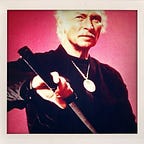1986 in Film — Top Gun
Release Date: May 16th
Box Office: $179,800,601
So here it is: Top Gun (1986), the highest grossing film of the year. It’s a pop culture icon that has firmly embedded itself in the collective unconscious. So what can you say about it? Let’s just go through some of the ways this film impacted cinema:
Established Tom Cruise as an A lister
I mean, this kind of goes without saying. Prior to this Cruise had been in Risky Business (1983) and All The Right Moves (1983) and then Legend (1985) which had been a bit of a misstep. With this film, though, he went through the roof and up into the stratosphere. Of course the ride up there would be bumpy but it was Top Gun that enabled him to get up there.
It cemented the Don Simpson legacy
Don Simpson defined 80s mainstream cinema with three films: Flashdance (1983), Beverley Hills Cop (1984) and Top Gun. They created a template that would change the face of Hollywood film making. Heavily focused grouped, aimed at demographics, marketed to within an inch of it’s life wrapped in the glossy fast cutting style influenced by MTV. Whilst Jaws (1975) and Star Wars (1977) are the films people point out when we talk about the start of the Summer Blockbuster culture, it was the Don Simpson produced films that defined that. Jaws may have been a monster success thanks to it’s marketing campaign but it still opened on a small numbers of screens and grew outward from there. It was with Top Gun that the rush to that opening weekend started, where the marketing budgets began to vastly inflate, where it became less about making a quality film and more about selling a product. Films boiled down to a high concept. That is the true legacy of the film and one that we’re still feeling today.
It defined movie soundtrack albums
So Tom stands up and sings You’ve Lost That Lovin’ Feelin’, a song by The Righteous Brothers and firmly imprinted it back into the public consciousness. The next year Dirty Dancing (1987) would would bring a whole raft of songs back to popularity and help foster a mini renaissance for these song from the 50s and 60s. Seriously, you couldn’t move in the latter half of the decade without hearing an old track crowbarred into a film. Cupid in InnerSpace (1987)? The Shoop Shoop Song? The ultimate example of this would be Unchained Melody in Ghost (1990) which would dominate the world. Of course, the real winners from the film would be Kenny Loggins and Berlin with Danger Zone and Take My Breath Away respectively. Both were huge successes in the charts pretty much acting as adverts for the film. Harold Faltermeyer worked with Simpson again after Beverley Hills Cop and whilst he wouldn’t have a hit like he did with Axel F from the previous film, his Top Gun Anthem was just as iconic.
The soundtrack album was a phenomenal success and whilst it didn’t start the trend (Ghostbusters (1984) and Footloose (1984) were other examples) it was the way that Top Gun packaged everything up into a big bundle that made it stand out. The thing sold a ridiculous amount of copies.
Tony Scott came out of his brother’s shadow
I mean. Alien (1979) and Blade Runner (1981)? Both films? Back to back? That’s what you have to compete with?
Scott’s first film, The Hunger (1983) was well received by the critics (and Susan Sarandon fans) and ended up being what secures him the Top Gun job. His previous work in advertising meant he was a perfect choice to film the US Navy aircraft, who worked with the production of the film. The whole thing has a glossy sheen that would come to define the Simpson/Bruckheimer films which would end up vomiting Michael Bay into the world.
Where the film fails to excite is with the non-action bits that are pretty simplistic. But that’s not the point of the film: it’s a collection of images and moments put together to sell the film as an experience, not a great story. Tony Scott would capture a massive audience with this style whilst his brother Ridley would hit a rough patch that would last for a good five years or so.
The impact of Top Gun is still echoing through cinema, both in style and in how films were commoditised. It’s one of the final steps in this process, one that began in the early 70s and was perfected here. It forms a template for the high concept blockbusters from here through to Armageddon (1998). Is that a good thing? Or a bad thing?
That’s a tricky question.
Originally published on Wordpress
